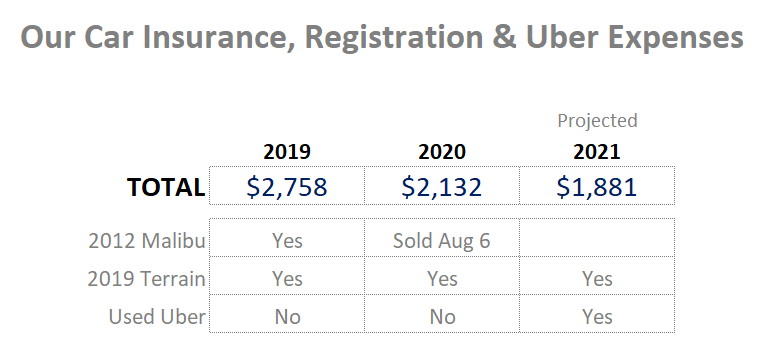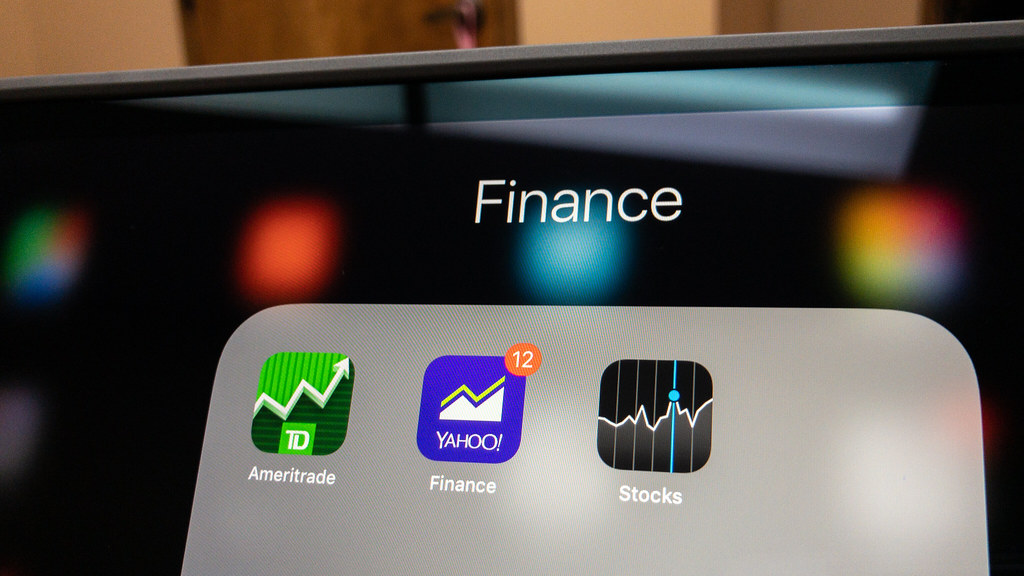|
Even before the pandemic hit, my husband and I had decided that it didn't make sense to keep an "extra" car in the garage 24x7. Basically, we realized we both did a fair amount of driving, but rarely at the same time. So last summer we finally got our act together and sold my car. (He agreed to share his car with me :) We also agreed that if it creates any problems, we'll buy another car. We figured that in the event we both needed the car at the same time, one of us could use Uber, or, worst case, we'd rent a car. The plan was to track our expenses to be sure this plan really did make financial sense in the long run. Nine months after selling my car, and almost a month after being fully vaccinated, we finally encountered a conflict. So I Ubered to lunch at a nearby restaurant yesterday to meet up with friends. The roundtrip transportation expense was almost $30; that was a lot more than I was expecting! So the first thing I did when I got home was calculate and compare car expenses over the last three years. Of course the pandemic makes it hard to know if today's calculations are useful in terms of predicting tomorrow's expenses, but here are the (very basic) findings: That chart is pretty basic. It doesn't include oil changes, repairs, and gas. Nor does it reflect the fact that we've turned the cash we got from selling a car into an apperciating, instead of depreciating, asset because we invested it.
Afterward I asked myself if there was any downside to the experience. I guess I didn't get to pick the radio station, but the interesting conversation may have been more enjoyable than anything I'd have heard on the radio. I was also little anxious about whether or not the car would arrive as promised and whether or not I'd get to lunch on time. The car did pick me up, and right on time, but I arrived 25 minutes early for lunch. Note to self: There's no need to add "buffer time" to the ride. There is also an upside to all of this; my husband's car is way nicer than mine was, so in a way, many of my driving experiences have been upgraded, although I do have to adjust the seat and mirrors each time I get in the car. (Next up: I need to figure out how to use the automatic seat adjustment feature, I guess.) And given we have different fill-up philosophies (he doesn't like to go below 1/8th of a tank and I like see how far below "E" the dial can go), I suspect I may never have to pump gas again :D Assuming an average cost of $30 for round-trip Uber rides, we'll need to use Uber more than once a week and then blow through all the money we've invested from the sale of my car before we lose anything with this plan. I just can't imagine that happening. Having grown up in the Motor City, never in a million years did I imagine giving up my car at 58. And yet here I am. -- Kathy
3 Comments
A fair number of people ask, "How did you know you had enough savings to retire?" Here's our short answer:
During our entire careers, my husband and I both worked in the IT industry and often for the same company. That's a risk. And after he was laid off in 2001, things felt even riskier. That probably caused us to be better savers than we might have been otherwise. The possibility of being laid off felt like a constant threat from that point forward. In late 2014, business conditions and things I was hearing at work made me feel especially vulnerable. I asked my husband, who manages our investments, if I'd need to get another job if I lost my current one. We were both pretty happy with the jobs we had, and at 52 and 53 we hadn't really been thinking about retirement. He asked, "How much money do you think we need every month ... for the rest of our lives?" (He manages the investments, and I manage the cash flow.) I threw out a number that pretty much aligned with our current spending rate and then assurred him I was capable of spending more. (I knew I could spend less too, but that wasn't my preference.) Three months later he gave me an answer: "We could retire right now!" In hindsight, he figures he built the mother of all spreadsheets that pretty much replicated the tools you can find online. If you're asking yourself the same question, your time will probably be better spent finding a tool rather than building one yourself. The answer to my question changed everything; suddenly we were truly working for fun. I lasted another two years and he lasted another three. We retired at 54 and 55; and so far, so good. We have found that a lot of the things we're enjoying most don't take a whole lot of money, but we think it's possible that may change over time. But as of right now, no regrets. In fact, we're having the time of of our lives. -- Kathy Related reading: When I was in my early 30s, I commented to a co-worker that my husband and I were planning to meet with a financial planner. The co-worker was a little younger than we were and said something like, "Just remember that you're smarter than the financial planner." My intelligence isn't something people comment about much, so the comment caught me off-guard. I went home and repeated it to my husband.
Since then (25 years ago) I've met some pretty smart financial planners, but my co-worker's comment launched a string of events that resulted in my husband and I continuing to manage our own finances and investments. Nothing we do is terribly sophisticated, but nobody understands our goals better than we do, and nobody understands our finances and investment choices better than we do. And, at least so far, it seems to be working well for us. -- Kathy Related reading: Disclaimer: I am not a financial advisor. The purpose of this post is simply to encourage others who want to learn more about managing their own investments.
Previously, I suggested that more people should consider managing their own investments because it is Easier Than You May Think, and it's like having a very part-time job with a very high compensation rate. If you're considering doing this, you'll want to find an investment approach that aligns with your financial goals. My goal is to be sure that my wife and I have enough money to support our comfortable lifestyle now that we're retired. This post compares two investing approaches. Some might consider these summaries over-simplified, and they probably are, but they'll provide a good foundation for readers who want to get started. The info isn't meant for people who've been managing their own investments for years, although I'd love to hear their input. Vocabulary
Approach 1: Traditional Investing Traditional investing involves purchasing individual stocks and/or mutual funds based on various quantitative and qualitative considereations. Typical quantitative considerations include revenue growth, earnings, and current stock price. Qualitative considerations can include things like industry trends, market dynamics, and even cultural shifts. You'll want to ask yourself questions like, "Are people drinking fewer soft drinks as they become more health conscious?", "Are brick-and-mortar stores disappearing as people do more online shopping?" and "Are others likely to copy the Uber model and apply it to different consumer services?" Then you'll want to identify companies that are likely to succeed. "Success" will probably be defined differently by each company. It could involve profitability, growth, innovation as well as other things. In the end, you'll want to purchase stocks that the market thinks will do "well" (since the market determines the price of the stock). The benefit of this approach is that there is potential for large gains ... if you buy the right stocks and/or mutual funds. The risk associated with this approach is that there is potential for large losses if you pick the wrong stocks and/or mutual funds. Some people don't like the potential volatility and risks associated with owning individual stocks because the possibility of large gains is coupled with the risk of large losses. To reduce the possibility of extreme outcomes, some invest, at least partially, in mutual funds. Just like stock, you'll want to do some research before selecting mutual funds. You'll want to ask yourself (and research answers to) questions like: "Do I think software is poised for a big gain?" and "Since electric vehicles seem hot, should I find a mutual fund that focuses on those?" You'll also want to ask yourself: "Is this particular fund being managed by someone with a good track record?" and "Is the fund efficiently managed?" In Summary Traditional investing delivers the possibility of large gains (e.g. Tesla has risen 7,000% in 2020 as of today). It also requires:
Approach 2: Low Cost Investing Low cost investors focus on purchasing mutual funds instead of individual stocks, and they specifically look for mutual funds with low fees and operating expenses. (Since mutual funds require specialists to create and manage them, there are management/operating costs and fees associated with them.) Low cost funds are set up to run with very little management by humans. This is achieved by creating funds whose components mirror common market indices such as the S&P 500 and Nasdaq (thus the term "Index Funds"). The benefit of low cost investing is that it usually delivers consistent, moderate returns over long periods of time. And those returns add up. The downside of this approach is that big increases in value in specific companies or even market sectors rarely result in dramatic gains to an indexed fund. In summary Low cost investing is most likely to produce steady, moderate gains instead of rapid value fluctuations. It's less exciting when the market rises quickly and less scary when the market drops quickly. Which Style Is Right For You? Some people prefer traditional investing because it's easy to understand and/or they enjoy the "thrill" associated with it. Personally, I'm not a fan for the following reasons:
The "father" of low cost investing is the late John ("Jack") Bogle, the founder of Vanguard. Bogle's philosophy for investing and building wealth includes investing in low cost funds, investing early and often, and keeping investments simple, among other behaviors. Information about the Bogleheads® investment philosophy makes for interesting and valuable reading. Low cost investing methodologies are unlikely to enable you to tell dramatic financial stories at cocktail parties. (e.g. You won't be able to talk about buying Tesla at $14/share now that it's at $695/share.) But Low cost Investing may mean you no longer need to work when you're 70. (And it may prevent you from needing to lament, "I was absolutely positive Enron was my ticket to early retirement.") -- Jim Related reading: My wife and I manage our own investments. As mentioned previously, It's Easier Than You May Think. There is a wealth of information online, and while we don't think it's worth it to pay someone else to manage our money, that doesn't mean we never ask for advice.
Finding valuable financial advice isn't hard. Big investment houses (like Fidelity and Vanguard) have knoweldgeable employees who are willing to talk with you and provide advice that aligns with your goals. In fact, this can be a key benefit of consolidating your investments in one place: The larger the value of your assets with them, the more services they provide (and usually at no additional charge). You can also hire fee-only investment advisors; people you pay for their time and expertise, just like you'd pay any other professional such as an attorney or doctor. Fee-only advisors provide guidance based on your age, goals, assets, risk tolerance, and other factors. Online resources, books, podcasts, and friends can also provide useful advice, or at the very least, ideas. It's critical that you take all the information you gather and then decide if it's right for you. Just because a professional suggests a plan, it doesn't necessarily mean it will help you accomplish your goals. Over the years, my wife and I have received some great advice, and we've also received advice that left us wondering if the advisor had heard anything we'd said or maybe our communication skills were lacking. For example ... When our kids were very young (and before we'd decided to manage our own investments) we visited a traditional investment advisor who was highly recommended by a friend. We had some savings and we were participating in our employer's retirement plans. The advisor asked us about our current financial situation and then said, "You're saving too much. Lighten up. Find some ways to spend more money." As we were driving home, my wife reflected, "He gave us that advice without asking about our goals and concerns. He didn't even ask if we were satisfied with our lives right now." Our first meeting with this advisor was also our last. On the other side of the coin, a Fidelity advisor was looking over our portfolio and said, "You've chosen some bond funds that aren't going to behave very well if interest rates change." He walked me through the steps to find an important piece of information about each fund. Then he described what this information meant and why it was important. I ended up making a number of changes to our portfolio based on that input. He helped us eliminate thousands of dollars of risk I'd unwittingly baked into our portfolio. It was very valuable input! This past summer, with COVID-19 in full swing and a Presidential election on the horizon, my wife and I had been discussing the state of the economy and how much money we wanted to have in cash in case the market took a big dive. Although we both had concerns about the market, my wife was advocating for a larger cash position than I was and larger than what was recommended in most scenario recommendations. After speaking with an advisor at a major investment firm, I confidently announced, "We have nothing to worry about. We have a bit more cash than the advisor recommends. We don't need to change anything." As I finished the thought, she was already saying "Whoa whoa, whoa! We need to talk about this." And talk we did. For hours and hours; about six as I recall. We discussed goals, a recognition that we both place a high priority on being able to sleep at night, and that our first objective was security, not maximizing returns. This led to a bit more online research and a conversation with respected neighbors (who stood > 6 feet away). In the end we increased our cash position ... by quite a bit. From the investment advisor's perspective, this was the wrong thing to do. But there was no question in our minds It absolutely was the right thing to do ... for us. If you're managing your own investments, seek input from others, but don't necessarily follow it until you're sure it's right for you. When you combine what you know, what you learn, and what makes sense for you, it's an unbeatable combination, and you're most likely to achieve your goals. -- Jim Related reading: When something needs to get done do you tend to do it yourself or pay a professional to do it for you? House needs a new roof? I'm calling a roofer. A room needs painting? I'm off to research local painters. And although changing the oil in my car is not very difficult, I take it to the local shop. Other things, however, I refuse to hire out. I enjoy cutting the grass. And last summer I replaced the (regular sized) door that goes from our garage to the back yard.
What about your investments? Do you manage your investments yourself or do you have someone do it for you? Many people we know hire someone to manage their long term investments. It doesn't sound all that expensive. Management and trading fees generally run about 1.65% of total assets being managed. That sure doesn't sound like very much ... until you do the math to calculate the costs. Wouldn't it be nice if you could eliminate that annual expense? You probably can. Managing your own investments is easier than many people think. Yes, it requires some "startup" time. Yes, some basic knowledge needs to be acquired. You may even have investments spread across multiple institutions which may be easier to manage from a single institution. (Consolidating at one financial institution can provide benefits not available when assets are in different places.) Getting things set up also doesn't always mean doing everything by yourself. Talking to a fee-based investment advisor can be very helpful. In this scenario you're paying a professional for advice based on your goals but implementation is done by you. (It's like hiring an architect for design but construction is done by the homeowner.) Investing companies such as Fidelity offer services like this as well. Once some foundational concepts are understood and established, ongoing management takes surprisingly little effort. Where can you get started? Managing your own investments isn't for everyone ... just like painting a room isn't for everyone and changing the oil isn't for everyone. However, if you are currently paying someone to manage your money, I encourage you to be sure you know exactly what it is costing you. You might discover you just uncovered a simple part-time job that pays really well. -- Jim |
Lessonswe're learning ArchivesCategories |
Retirement Realities








 RSS Feed
RSS Feed